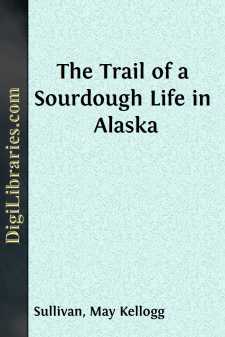Categories
- Antiques & Collectibles 13
- Architecture 36
- Art 48
- Bibles 22
- Biography & Autobiography 813
- Body, Mind & Spirit 142
- Business & Economics 28
- Children's Books 15
- Children's Fiction 12
- Computers 4
- Cooking 94
- Crafts & Hobbies 4
- Drama 346
- Education 46
- Family & Relationships 57
- Fiction 11828
- Games 19
- Gardening 17
- Health & Fitness 34
- History 1377
- House & Home 1
- Humor 147
- Juvenile Fiction 1873
- Juvenile Nonfiction 202
- Language Arts & Disciplines 88
- Law 16
- Literary Collections 686
- Literary Criticism 179
- Mathematics 13
- Medical 41
- Music 40
- Nature 179
- Non-Classifiable 1768
- Performing Arts 7
- Periodicals 1453
- Philosophy 64
- Photography 2
- Poetry 896
- Political Science 203
- Psychology 42
- Reference 154
- Religion 513
- Science 126
- Self-Help 84
- Social Science 81
- Sports & Recreation 34
- Study Aids 3
- Technology & Engineering 59
- Transportation 23
- Travel 463
- True Crime 29
The Trail of a Sourdough Life in Alaska
Description:
Excerpt
CHAPTER I
THE MINER'S REASONS
A furious blizzard was raging. Six or eight miners of various ages were huddled around the stove in a little road-house where they were likely to remain storm-bound for several days.
"Chuck some more wood into that bloomin' fire and fill up my pipe if you fellers want a yarn from me," said one, when they had besieged him for a story with which to pass the time.
"You wanted to know yesterday when I staked that claim for the woman, who and where she is, also my reasons for stakin' it; and I promised to tell you when I got the chance. One or two of you grumbled considerable at my stakin' for a person away in the States, and maybe when I have finished my story you won't feel any different; but I can't help it, and it is none of your —— business. The deed is done, and well done, and Rosa Nell (that ain't her name, as you can see by the initial stake if you want to dig it out from under the snow) is the half owner today of one of the handsomest quartz ledges on the whole Seward Peninsula. Walls of grey slate and trachyte, and the yellow stuff is good and plenty. Zounds, boys! I wish I had a bumper," and the speaker threw his furry cap to the ceiling.
"Never mind the bumper, pard, you know it's the last of March when no live mining camp in this country has a thing but empty bottles to bump with. Behold the size of the glass dump outside yonder if you don't believe me", remarked the keeper of the place in vindication of his house; but with sore regret in his voice.
"The story, the story! We want the story", sang out one and another by the stove, "the fire is just a whoopin' and 'twill soon be goin' out".
"Well, then, here goes," said the miner addressed. "It happened two years ago. I sold one of my Nome claims for fifteen hundred dollars with slight prospecting, (like a blasted fool that I was) and after blowin' in a good third or more of the money concluded to buy a thousand dollar outfit and go to Norton Sound. It was late in October; the storms came on, and the upshot of it was that we were ship-wrecked off the coast and were finally put in at a small camp nearly a hundred miles from where we wanted to winter. I had taken two men with me named Long and Hartley, and though we saved, by hard fightin' in one way and another, the most of our supplies, we were without shelter, except a couple of tents, with an Arctic winter—our first in this country, upon us.
"Gee-Whilikins! Boys, it makes my black hair white to think of it! What we suffered for two months in those tents was awful; for the camp was full and there was not a vacant cabin anywhere. If there had been, you know we were absolutely without money to buy or build with. How I cursed myself for havin' foolishly spent hundreds of dollars on 'box rustlers' at the Casino,—but that is another story, boys, so we'll pass it.
"In our new camp we had many Eskimos and all kinds of people. Among others there was a little blue-eyed woman perhaps thirty years of age; maybe more—maybe less. She was also evidently not where she had intended to be, just like ourselves, but was a teacher, left over from some stranded expedition, probably. Anyhow, there she was, and there we were. We a-livin' in the tents, and the thermometer forty degrees below zero. The teacher was stayin' with some of the Missionary folks only a quarter of a mile away, and she was all right.
"In December the dogs of the camp began to go mad. Every few days one or two had to be killed. Some men, you know, don't water their dogs once in six weeks, if at all, and as everything is froze hard in winter, the poor brutes go mad, exactly as in summer in the States, from heat.
"One night, Long and I smoked in the little road-house close by, but Hartley went to his bunk in the tent and turned in....



